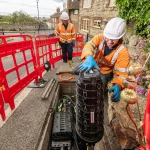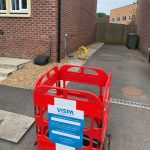Broadband ISP Brsk Fined £14k by Ofcom UK for Telecoms Poles Rule Breach

Alternative broadband ISP Brsk (Netomnia) has been fined £14,000 by Ofcom over its roll-out of hundreds of new 9 metre high telecoms poles in the city of Birmingham, which were installed to support the roll-out of a new full fibre (FTTP) network. But they were today found to have breached two conditions under the Electronic Communications Code (ECC).
Just to recap. Brsk and Netomnia are in the process of merging and have so far deployed their Fibre-to-the-Premises (FTTP) broadband network to cover 2.5 million UK homes (inc. 325,000 customers), which is expected to reach 3 million premises by the end of 2025 and then 5 million by the end of 2027. The use of poles to deploy their new fibre forms a big part of this process.
The deployment of wood poles to run overhead fibre is a common practice across the UK. This is because poles are quick and cost-effective to build (several times cheaper than trenching), can be deployed in areas where there may be no space or access agreement to safely put new underground cables, are less disruptive (avoiding the noise, access restrictions and damage to pavements of street works) and can be built under Permitted Development (PD) rights.
Advertisement
However, network operators do still have to follow a Code of Practice for this process, which forms part of the ECC Regulations. But last year saw Birmingham City’s Local Planning Authority (LPA) raise a complaint with Ofcom over Brsk’s approach (here), which accused the operator of failing to consult planning authorities about the installations, and failing to provide 28 days’ notice in writing to the planning authority in an area where the provider has not previously installed such equipment.
On 4 July 2025, Ofcom issued its Final Decision to BRSK in respect of BRSK’s compliance with the Electronic Communications Code (Conditions and Restrictions) Regulations 2003/2533 (as amended) (‘the Regulations’).
Ofcom has determined that there are reasonable grounds for believing BRSK has contravened its obligations under the following Regulations, when installing electronic communications apparatus in the Birmingham City area:
- Regulation 3(1)(b), which states that “a code operator shall consult – planning authorities in relation to the installation of electronic communications apparatus…” and
- Regulation 5(1)(a), which states that “a code operator must give 28 days’ notice in writing, to the planning authority for the area in question where the code operator has not previously installed electronic communications apparatus in the area and (subject to paragraph 1A) is intending to install such apparatus in the area.”
In light of this finding, Ofcom is imposing a penalty of £7,000 for each contravention, totalling £14,000, on BRSK. This penalty was set having regard to the statutory limit of £10,000 per contravention, as well as our Penalty Guidelines. The final penalty amount reflects a 30% discount on the penalty Ofcom would otherwise have imposed following BRSK’s full admission of liability and agreement to settle this case.
The penalty amount reflects several factors, including that Ofcom considers these breaches represent a serious failure to follow important Regulations which intend to provide safeguards to local communities. In this case, hundreds of pieces of electronic communications apparatus were installed without the knowledge of the local authority and, therefore, without a proper understanding of how BRSK’s deployment might potentially impact local considerations. Ofcom also considered the need to deter BRSK and other Code Operators from future contraventions of these important Regulations in future.
The obligation to engage with planning authorities prior to installing network infrastructure is an important part of the Regulations. Through this engagement, planning authorities can draw relevant local considerations to the provider’s attention – such as possible hazards or visual amenity concerns – and set appropriate non-binding conditions for the provider.
Suffice to say that, at the time, Brsk was already facing some local opposition to their deployments, which helped to fuel the original complaint. The mistake itself seems, however, unlikely to cause too much of a financial headache (Ofcom has limited enforcement powers in this area), although it may still have a greater reputational impact.
The full decision document further reveals, on the second contravention, that Brsk failed to give Birmingham City’s Local Planning Authority 28 days’ written notice prior to installing a total of 672 poles and 21 street cabinets in the Birmingham City area from July 2023 until 3rd April 2024. Ofcom added that “there is no evidence that the breach occurred deliberately“.
Advertisement
During the investigation, Brsk acknowledged to Ofcom that “there was a failure with [our] internal processes to ensure the necessary consultation took place with the Local Planning Authority prior to the installation of its Apparatus.” The operator also shared the steps it had taken to rectify this in the area:
Brsk’s Steps to Resolution
(a) Providing [Birmingham City’s Local Planning Authority] with retrospective consultation and notices in respect of all pole and cabinet apparatus installed.
(b) BRSK will make an upfront commitment to [Birmingham City’s Local Planning Authority] that they will meet any objections raised by the Local Planning Authority function.
(c) Regarding issues raised by local residents and business owners relating to BRSK’s pole and cabinet apparatus, BRSK undertakes to work closely with them to address any concerns.
The wider public frustrations around the building of poles are of course quite well known. The industry did recently introduce new ‘Best Practice Guidance for Poles’ to help tackle this area, which generally requires network operators to have greater engagement with and respect for community wishes. So far, it remains rare for network operators to break the rules that exist in this area (or at least to be found to have broken them), and hopefully it won’t happen again.
Mark is a professional technology writer, IT consultant and computer engineer from Dorset (England), he also founded ISPreview in 1999 and enjoys analysing the latest telecoms and broadband developments. Find me on X (Twitter), Mastodon, Facebook, BlueSky, Threads.net and Linkedin.
« O2 UK Launch Smartphone Skin Case to Visualise Sun’s Harmful UV Rays UPDATE






















































This raises pertinent questions for all of those multiple regions where similar breaches of the industry’s Code of Practice occurred by other code operators, including far more serious Health & Safety breaches that were reported (and evidenced) by many residents but were summarily swept under the carpet by various local authorities, local MPs, HSE (Health & Safety Executive), subsequent Ministers for Dept for Science Innovation & Technology and OFCOM. Why were no OFCOM fines ever levied? Why was definitive action never taken against these dangerous cowboys?
Additionally,:
1. Why is OFCOM limited to fining just £10000 per breach?
2. Why is any kind of mitigating discount levied? BRSK knew at the start of their installations that they were breaching the CoP but they chose to carry on anyway.
3. Why is Minister Chris Bryant MP not acting apace to protect our communities from these under-regulated cowboys and preventing the unnecessary overbuild that now litters our homesteads?
4. When will the Minister change the legislation to prevent the unnecessary duplication (and more) of broadband networks?
5. When will the Minister order the removal of unnecessary infrastructure and return our streets to their previous uncluttered condition?
1. OfCOM is limited to fine as set out by the powers given to it by parliament.
2. Mitigating discounts are usually awarded when the defendant co-operates fully and remedies their defective process, which BRSK appear to have done.
3 and 4. Neither of these are going to be an option in a market where both government and consumers want and benefit from a competitive environment. If you want a comparison go take a look at broadband costs in Jersey which are usually north of £60 for a worse service, mainly because there’s a lack of true competition. What I would however advocate for is a process whereby OpenReach get to adopt any poles put up by another Telco so a street doesn’t end up with two or more sets of competing poles.
5. Ministers will not order the removal of infrastructure that was permitted by law, because the infrastructure owner will then just sue the government for their costs to remove it.
I can help with some of these.
1) That’s the law. Electronic Communications Code (Conditions and
Restrictions) Regulations 2003/2533 (as amended) Section 110A.
2) As the decision states Ofcom disagree that it was intentional, Brsk sought to settle and were open and cooperative.
Section 6 details but most relevant section:
Culpability and remedy of breach
6.14 There is no evidence that the breach occurred deliberately, and we have no reason to believe the contraventions identified in this investigation occurred because BRSK sought to make a financial gain.
Unless you know something they don’t you’ve no reason to claim it was intentional and it in no way benefited Brsk.
3) and 4) The challenge is identifying what’s ‘unnecessary’. At very least the first set of new infrastructure in one part of East Yorkshire was definitely not unnecessary, there was no viable way to use the existing plant. He should deal with those who are abusing the present regulations for sure.
5) When it’s unnecessary the entity that stood the poles can remove them. If the entity goes out of business there should be money put away to remove them.
If you’re hoping that now KCOM are sharing infrastructure MS3/Connexin will be required to remove their poles and use the KCOM plant that is extremely unlikely. They would be justified in seeking compensation and that compensation would come from the taxpayer.
Recovery of redundant street furniture is going to be an interesting thing as Openreach and Virgin Media retire copper.
We recently moved to BRSK after being told they offer faster broadband however that is true and has more than halved our monthly bill. But tend to lose connection to the sky glass TV daily.